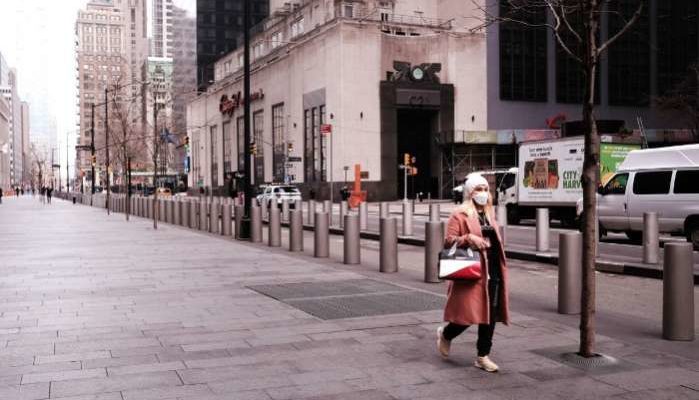As the COVID-19 pandemic stretches into its second month and shows no signs of slowing, President Donald Trump has pushed to relax the restrictions on travel and movement that are, right now, the best hope for controlling the disease. “We have to get our country back to work,” Trump said in a town hall at noon on Tuesday. “This cure is worse than the problem. Many people — in my opinion, more people — are going to die if we allow this to continue. Our people have to go back to work.” He named Easter Sunday, April 12th, as a potential end date for the restrictions since “you’ll have packed churches all over our country.”
But there’s a problem with trying to restart the economy by relaxing containment restrictions: economists say it won’t work.
The economy can’t recover until the pandemic is under control, says Maurice Obstfeld, a professor at the University of California, Berkeley and former chief economist at the International Monetary Fund. “Before we restart economic activity, we have to stabilize the level of infections,” Obstfeld tells The Verge. If we move too soon, he worries we would see a new surge in infections, “causing even more damage to the economy than if we confronted the health crisis decisively now.”
In recent days, conservative media has increasingly promoted the idea that the containment restrictions are doing more harm than good. In a Fox News interview on Monday, Texas Lt. Gov. Dan Patrick seemed to call for a broad repeal of restrictions, regardless of the human cost. “My message is, let’s get back to work,” Patrick told Tucker Carlson. “Let’s get back to living. Let’s be smart about it. And those of us who are 70-plus [years old], we’ll take care of ourselves. But don’t sacrifice the country.”
Former Fox host Glenn Beck put it in even starker terms. “I would rather have my children stay home and all of us who are over 50 go in,” Beck told his audience on Tuesday night. “Even if we all get sick, I would rather die than kill the country.”
As those pundits frame it, the recent economic collapse is caused by public health restrictions rather than the coronavirus itself, and loosening those restrictions could potentially lessen the damage. But the economists studying the recession see a return to normal activity as likely to cause yet more economic damage.
Given the exponential growth of the disease, University of Michigan economist Justin Wolfers says it is cheaper to stop the spread today than it will be tomorrow. “The relevant choice is whether to take dramatic actions today when the number of cases is measured in the tens of thousands,” he says, “or whether to take even more dramatic actions in the future when the number of cases is measured in the hundreds of thousands, or in the millions.”
The number of confirmed US cases is rising by roughly 38 percent each day, on pace to reach into the hundreds of thousands by the end of the week, according to data collected by Johns Hopkins University. Deaths have been rising at a slower rate, around 23 percent per day, suggesting some of the rise in case count may be the result of accelerated testing. Still, any relaxation of social distancing would likely cause those numbers to spike, with devastating consequences for both public health and economic activity.
As a result, even skeptical economists are recommending a measured response rather than a return to the status quo. Harvard economist James Stock, who is a member of the National Bureau of Economic Research, said he believed that the public health response had underplayed the ongoing economic crisis.
“I think the right framing is, how can we most efficiently reduce the spread of the virus while allowing some economic activity,” Stock told The Verge. Still, more testing is required before meaningful recovery measures could be put in place. “Random testing of the population is badly needed to understand prevalence and the asymptomatic rate.”
Countries like South Korea have been able to get the outbreak under control by testing the population broadly — whether or not people had symptoms — and then isolating those who tested positive. But the US still faces a massive shortage of test kits, which means that doctors can’t even test every patient with symptoms. Without more tests, it will be hard to get a handle on who is at risk of transmitting the disease — and hard to relax restrictions without driving up infections.
It’s unclear how the White House plans to proceed. In a press conference on Tuesday at 5:30PM ET, the president continued to reference the Easter goal but seemed to lower expectations for an end to social distancing. “I’m hopeful to have Americans working again by that beautiful Easter day,” Trump said, “but rest assured that every decision we make will be grounded in the health, safety, and well-being of Americans.”
In the meantime, experts say the economic crisis will be hard to separate from the public health problem. “My worry is that right now, we have the worst of both worlds: a stalled economy and an ineffective public health response to the pandemic,” Obstfeld says. “The answer is not simply to pretend we can go back to business as usual.”




